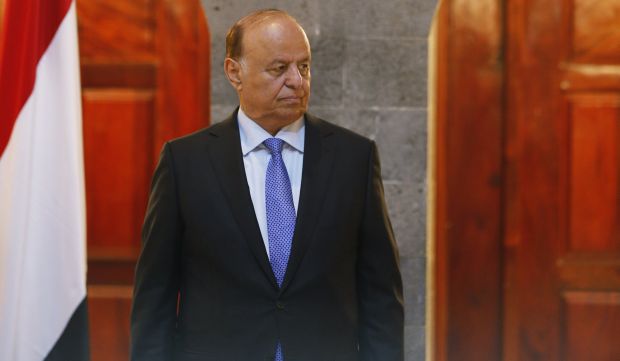Yemen’s President Abd Rabbuh Mansur Hadi has accused Iran of being behind the turmoil in Yemen more than once. He blamed Iran for the Houthis’ recent seizure of the city of Omran, the gateway to the capital, Sana’a. I have no doubt that Iran is active in Yemen, including funding and arming rebels, but this does not justify the failure of the Yemeni leadership, the defeat of the army, or the way the country has been left to slide to the edge of a cliff.
The situation in Yemen requires a leader, not just a president of compromise. President Hadi is fighting on several fronts, but he has to be honest with himself. If he cannot face these serious challenges, he has to step down. His leadership has failed to achieve the reconciliation that was the only reason for its existence, and because of this failure, rebel bastions have multiplied across the country. President Hadi is besieged by angry tribes, Houthis, Al-Qaeda, Al-Islah, Southern Separatists, and remnants of the former regime. No other state in the world has so many enemies. These enemies can sense the almost tangible ineptitude of the current leadership, and they can see the state hovering on the brink.
President Hadi cannot blame Iran for all that is happening in Yemen. Rather, he should blame his political team, which has failed to unite rivals and take advantage of the UN envoy’s efforts to minimize disputes. Hadi did not provide realistic solutions, and so he did not succeed in reducing conflicts. His failure to convince his allies—never mind his enemies—is not the only problem; his administration and personal reputation have also been heavily criticized. He is also coming under increased fire for allowing his sons to interfere in state affairs.
Some of Hadi’s critics point out that they had wanted to get rid of former president Ali Abdullah Saleh, not replace Saleh with a leader just like him. Hadi’s leadership was the result of a compromise, and he was named to succeed an authoritarian president who ran the country with cunning and force for 33 years. Hadi is not authoritarian like Saleh was, but over time he is losing his friends because of his political, military and personal failings. Yemenis will never accept his sons playing a role in politics. If the people were to choose between the former and current presidents’ sons, they would choose Ahmad, the elder son of isolated president Ali Abdullah Saleh. Ahmad was known as a respectable man who played a positive role during the transitional phase. But at that time, people did not want anyone from Saleh’s entourage to be their next leader.
Regardless, the dangers are growing now more than ever in Yemen. The country has never been threatened so severely with disintegration and conflict as it is today, not even during the Imamate war in the 1960s, the wars in the 1980s and 1990s, or the revolution against Saleh’s regime. Regional and international powers, along with the Yemeni leadership, should aim to avoid the collapse of Yemen. Only two years ago, when Saleh fell, they were all looking forward to establishing a progressive and stable state.
